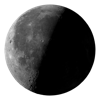Planets Visible Tonight from Gros Islet, Saint Lucia
This page shows planetary visibility conditions for Gros Islet, Saint Lucia
(
At a Glance
| Planet | Visibility | Notes | Mag | Elongation |
|---|---|---|---|---|
| Mercury | Before sunrise, difficult | Rises at 04:59 | -1.19 | 11° W |
| Venus | End of the night | Rises at 03:02 | -4.54 | 45° W |
| Mars | Beginning of the night | Sets at 23:40 | 1.14 | 75° E |
| Jupiter | After sunset | Sets at 20:15 | -1.93 | 26° E |
| Saturn | End of the night | Rises at 02:16 | 1.12 | 60° W |
| Uranus | Not visible | - | 5.85 | 2° W |
| Neptune | End of the night | Rises at 02:20 | 7.79 | 58° W |
Moon: Third Quarter,
Planet Visibility Details
Mercury
will be difficult to observe because it rises only
Venus
is in excellent visibility conditions for early morning observations.
It rises at
Mars
will be in good visibility conditions after sunset and during the first part of the night.
It sets at
Jupiter
sets
Saturn
is in good visibility conditions towards the end of the night.
It rises at
Uranus will not be visible tonight because of its elongation of only 2° from the Sun.
Neptune
is in good visibility conditions towards the end of the night.
It rises at










